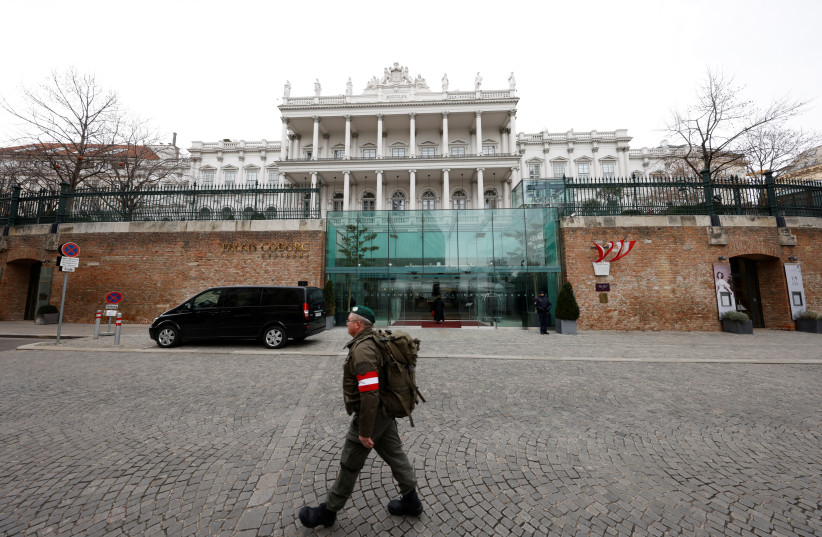The US adopted some of Israel’s points opposing Iran’s latest demands in nuclear talks, Prime Minister Yair Lapid said on Thursday, the day after Washington submitted its response to the most recent draft of the deal.
“This is a bad deal.... The Americans accepted a large part of what we wanted them to put into the draft and that is a welcome change,” Lapid said at a Yesh Atid faction meeting. “The dialogue with them is good and we will continue.”
In response to a question about opposition leader Benjamin Netanyahu’s criticism that the government is not being aggressive enough in its opposition to the Iran deal, Lapid said, “We are working with the US administration in the right way, with patience and determination, and bringing results.”
The prime minister also attributed Israel’s success in influencing the American position to National Security Adviser Eyal Hulata’s “intensive talks” in Washington this week, including with his counterpart, Jake Sullivan, and US Deputy Secretary of State Wendy Sherman. Defense Minister Benny Gantz is expected to meet with Sullivan on Friday.
The view in Jerusalem is that the US was firm in its response to Iran’s demands after the EU tabled a draft of a nuclear deal it said was final. That means Iran would have to back down from its demands in order to reach a deal without resuming negotiations in Vienna.

Iran's nuclear talks
As such, Iran is likely to ask to enter a tenth round of talks.
Tehran, however, denied that the US toughened its stance, with its negotiating team’s spokesman Seyed Mohammad Marandi adding, “Iran has achieved a lot over the past few months as well as in recent days. When this chapter is closed, it will be clear for all to see.”
Tehran sent its response to the “final text” of the deal to revive the 2015 Joint Comprehensive Plan of Action last week.
Their demands focused mostly on ensuring that future US presidents will not be able to leave the deal as Donald Trump did in 2018, something that President Joe Biden cannot legally promise, because the agreement is not a treaty ratified by Congress.
Iran also seeks guarantees that Western corporations will do business with the Islamic Republic, having been disappointed in their reluctance to do so after 2015.
What's included in the latest Iran nuclear deal draft?
The latest draft of the deal states that foreign companies can continue working in Iran for two-and-a-half years in the case of a party to the deal leaving. However, a future US president would not be bound by this.
In addition, the Biden administration plans to maintain some Trump-era sanctions on Iran and Iranian entities, such as the Islamic Revolutionary Guard Corps, for human rights violations and support for terrorism, which could deter Western businesses from opening operations in the Islamic Republic. The IRGC, which is behind Iran’s exports of terrorism and support for proxy militias throughout the Middle East, is a key part of Iran’s “revolutionary economy,” playing a role in many major industries in the country.
The new deal reportedly circumvents sanctions on non-American companies working with businesses that have transactions with IRGC-owned companies.
The text also stipulates that not all of Iran’s advanced centrifuges will be shipped to another country, allowing Tehran to quickly return to uranium enrichment in case Washington leaves the deal again.
Separate from its response to the text, Iranian officials have said they will not join the nuclear deal until the International Atomic Energy Agency closes its investigation into traces of enriched uranium found outside declared nuclear sites. IAEA Director-General Rafael Grossi, however, said this week that the probes will not end until Iran provides satisfactory answers to his agency’s inquiries, and the US reiterated that position.
Iranian Foreign Minister Hossein Amir-Abdollahian said his country is “carefully analyzing the American response and the latest text.
“ We’re very serious about remaining safeguard issues and we’re not willing in any way to allow some political and baseless accusations of the IAEA against Iran to remain, in a situation where all parties return” to the deal, Abdollahian said, according to Iranian journalist Abas Aslani.
Lapid pointed out earlier on Wednesday that, rather than accept or reject the supposedly final draft, Iran made more demands and called for additional concessions.
“This is not the first time this has happened. The countries of the West draw a red line, the Iranians ignore it, and the red line moves,” Lapid lamented.
Lapid also spoke in recent days with French President Emmanuel Macron and German Chancellor Olaf Scholz, whose countries are parties in the talks, saying that he has a “close, almost daily, dialogue with the UK.”
Israeli officials have recently also discussed the deal with its other non-Iran parties Russia and China.
A renewed nuclear deal will free up $100 billion annually for Iran to spend on spreading instability and terrorism around the globe, the prime minister warned.
Iran nuclear deal: JCPOA
The 2015 Joint Comprehensive Plan of Action lifted sanctions on Iran in exchange for limitations on its nuclear program. Those restrictions expire over time, ending in 2030. Limits on the manufacture of advanced centrifuges are due to expire next year. The deal does not address Iran’s sponsorship of terrorism, proxy warfare, ballistic missile program or other malign actions.
Iran far surpassed the JCPOA’s restrictions for enriching and stockpiling uranium, enriching to 60% purity when only 3.67% is permitted. Weapons-grade uranium is 90% enriched.
Lapid and Mossad chief David Barnea met on Thursday to discuss the latest state of the Iran talks, among other ongoing security issues. Barnea briefed Lapid on “the dangers in returning to the Iran deal,” the Prime Minister’s Office said.
